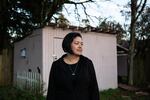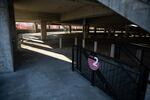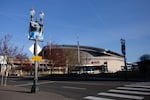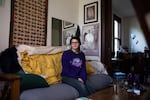Annelise Neville's coworker emerged from the breakroom Wednesday night at the Moda Center with news Neville found hard to believe: The NBA had suspended its season after a player contracted coronavirus amid the global pandemic.
Neville quickly realized that she and hundreds of other service workers at the Moda Center — people who make the arena run during Portland Trail Blazers games, concerts and events — would soon be out of work.
“‘There’s no way, dude,’” Neville remembered thinking. “Then we found out and I immediately, honestly, fell apart. I started to cry. I had to go hide somewhere to compose myself — because it’s my only job currently.”
And she had to do her job that night. The Moda Center was hosting thousands of people for a Tool concert that turned out to be its last major event for some time.
“Usually, you leave your problems at the door,” Neville said. “Last night, my problem was inside the door.”

Annelise Neville in the backyard of her home in Portland, Ore., Friday, March 14, 2020. Neville's bartending job at Moda Center was her only source of income and doesn't know where she'll find more work during the large gatherings ban.
Bradley W. Parks / OPB
Moda Center employees had to carry on with the event not knowing when they would come back. Not only that, but they had to do so in the same situation government and health officials were saying was too dangerous to continue.
“It really did feel like cognitive dissonance,” said Ruth Eddy, who also tends bar at Moda Center, “because I was in this building, this like concrete dungeon, and just had heard that because of these health concerns the NBA was gonna stop having games — yet I’m in this building right now with 13,000 other people.”
Not long after the NBA news, Oregon Gov. Kate Brown announced a ban on public gatherings of more than 250 people through at least April 8. It's one of many measures state and local governments around the country are taking to try to limit the spread of the novel coronavirus, which had infected more than 3,000 people and killed 59 in the U.S. as of Sunday morning.
While many white collar workers are now telecommuting to their jobs, others don’t have that option. People in the service industry often rely on large gatherings to make a living. Their jobs often pay lower wages and many depend on tips.
Many of those large gatherings went out the window with the suspension of the NBA season. The Portland Trail Blazers' average attendance is about 19,000 people, according to Hilary Gorlin, a spokesperson for the team.

A parking lot outside Moda Center sits empty in Portland, Ore., Thursday, March 12, 2020. This lot would normally be full on a night the Trail Blazers were set to host the Memphis Grizzlies. The game was postponed when the NBA season was suspended due to coronavirus.
Bradley W. Parks / OPB
Major League Soccer also suspended its season for a month Thursday morning. Providence Park, home to the Portland Timbers, seats about 25,200 people. Team officials declined to speak to OPB.
Nearby businesses were already feeling the pain before the suspension even came. Marathon Taverna sits kitty-corner to Providence Park. Bar manager Anestis Polizos called the loss “huge.”
He noticed seats were already starting to empty when the Timbers played Nashville SC on March 8.
“It was one of the lower-attended Timber games I can ever recall,” he said. “We’re in the thick of it. We’re in the stadium district. There’s 25,000 people one block away — you’re going to feel that.”
But Polizos wouldn’t speculate on what the season’s hiatus would mean for Marathon Taverna’s future.
“We’re in uncharted waters,” he said. “Nobody can say one way or the other.”

Left: News of the NBA shutdown is reflected in a Trail Blazers jersey at River Pig Saloon. Right: Ramsay Hattar says River Pig will lose business due to sports season suspensions.
Bradley W. Parks / OPB
Ramzy Hattar owns River Pig Saloon in Portland's Pearl District. He had returned from Spain just before the president restricted travel to and from Europe. Hattar's relief gave way to frustration an hour later, however, when he saw the NBA suspended its season.
“We’re strategically located in the Pearl. We’re less than a mile from the Moda and less than a mile from Providence Park,” Hattar said. “We know now we’re not going to get those sports crowds. We know we’re not going to get viewers of any sports. It drastically changes our weekdays, for sure.”
News of the NCAA canceling March Madness played on televisions in the River Pig Saloon when OPB visited Thursday.
“My business partner and I are going to have to sit down and figure out what we’re going to do about the schedules, with all the staffing hours,” Hattar said.
It’s hard to say exactly how much money is at stake citywide because of the sports cancellations, but estimates conservatively put it at millions of dollars.
A month ago, a group of businesses in the Lloyd District hosted a luncheon with a joint presentation from the Trail Blazers, the Oregon Convention Center and the Hyatt Regency hotel.
The presentation showed the Moda Center planned to host 216 events in 2020 that weren’t professional basketball or hockey, nabbing $22.5 million in revenue.
The coffee shops, restaurants and retailers will probably face a hit, too. And some already have, according to Jeremy Taylor, president of the Lloyd Community Association. Many who work in the area have already started staying home.
“We want people to be safe and healthy and well first,” Taylor said. “Right now, we just need to manage what’s in front of us.”

Signs welcome fans to an NCAA basketball tournament that won't happen.
Bradley W. Parks / OPB
Attendance shrank at the Moda Center in recent weeks, said bartender Ruth Eddy.
“Just the last couple games it was noticeably a little less people. It was kind of in the air,” she said. Before work Wednesday, staff shared news of other events canceling.
By the time the crowd arrived to see the band Tool, Eddy said, she could overhear concertgoers talk about the NBA season taking a break.
“It was really hard to try and take in that moment while I was in the physical space I’m at during all the Trail Blazers games,” she said. She pulled up the news on her phone. “My eyes just widened. I turned to my partner in the bar and she screamed.
“It just felt really heavy and hard news,” she said. “After that, it was like everybody already knew. The word spread so quickly within the building.”
Eddy said she’ll find other work and expects to stay afloat financially even amid the uncertainty, but she sympathized with coworkers whose futures are more ambiguous.
“It feels like I want to check in with them now more than ever,” she said. “And I’m realizing I don’t have these people’s phone numbers and I may not see them anywhere else outside of work.”

Ruth Eddy at her home where she lives with five roommates in Portland, Ore., Friday, March 14, 2020. Eddy works as a bartender at the Moda Center and learned the NBA suspended its season at the start of her shift.
Bradley W. Parks / OPB
Neville, meanwhile, said she was reeling. Her bartending job is her only source of income at the moment. She went from seeking a second job to seeking any job. She wondered how she’d afford the mortgage on her home in Portland’s Mill Park neighborhood.
Related: Coronavirus Puts Financial, Mental Strain On Gig Workers
“It was hard to keep going. Suddenly, I didn’t know how to pay any of my bills,” she said. “I’ll obviously have to find something.”
Oregon's ban on large gatherings is currently set to last four weeks. NBA Commissioner Adam Silver said in a letter to fans the league's intention is to resume the season if it's safe to play after a 30-day hiatus. But with how rapidly news has changed during the coronavirus pandemic, it's unclear if those deadlines will remain.
Neville's considered working a gig job like Postmates, which could be in higher demand as people hunker down at home. Worst case scenario, she said, she could rent out her home and move in with her parents in California. But even that sounded far fetched at this moment.
“Most of the people I know are bartenders,” she said. “They don’t have an income right now.”
Neville said she isn’t angry, however. She’s scared.
“I’m terrified of what happens next, and how bad this is going to get, how long,” she said. “I wish there was somebody I could blame but there isn’t — not anywhere around here.”